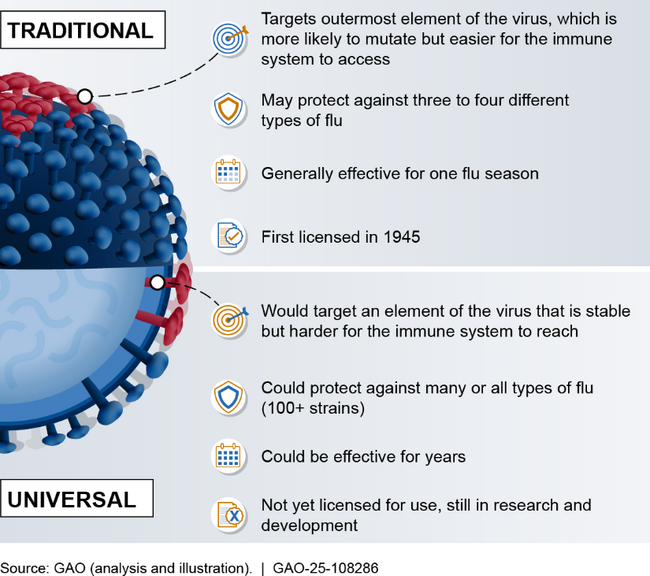Science & Tech Spotlight: Universal Vaccines
Highlights
Why This Matters
Existing vaccines for diseases such as flu and coronaviruses require frequent updating. In contrast, universal vaccines could provide long-lasting protection against many or all strains of a specific virus. Although they are in the early stages of development, these vaccines could someday improve public health and reduce vaccination frequency.
Key Takeaways
- Universal vaccines could provide long-lasting, broad protection against specific viruses and reduce the impact of outbreaks.
- Multiple candidates for universal vaccines have reached clinical trials, including flu vaccines.
- Further research on the potential effectiveness of universal vaccines could inform decisions on whether to further invest in this technology.
The Technology
What is it? Compared to existing vaccines, universal vaccines have the potential to provide longer-lasting protection against current and emerging virus strands, including those with the potential to cause pandemics. While traditional vaccines are generally effective against specific strains of a virus, they lose effectiveness because viruses change over time, which is known as mutation. In contrast, universal vaccines could offer protection against future strains of rapidly mutating pathogens like flu and coronaviruses.
How does it work? Universal vaccines are designed to train the immune system to recognize and target virus structures that are consistent across many or all strains of a given virus. For example, scientists are developing a universal flu vaccine that targets the part of the protein the virus uses to enter human cells. This part of the protein remains largely unchanged as the flu virus mutates. By stimulating an immune response to these stable elements, universal vaccines could provide broader and longer-lasting protection than traditional vaccines.
How mature is it? Researchers have made significant progress in understanding how universal vaccines could work. Advances in vaccine technology have improved the feasibility of universal vaccines. For example, scientists can now fuse together microscopic pieces of many different virus strains, increasing the number of strains that can be targeted in a single dose.
Since 2015, most clinical work on universal vaccines has focused on the flu, which mutates rapidly. Federal agencies have also invested in universal vaccine research. For example, the Department of Defense and National Institutes of Health (NIH) have funded research on developing a universal flu vaccine. In May 2025, the Department of Health and Human Services and NIH announced the development of a “next-generation, universal vaccine platform,” with trials for flu vaccines scheduled to begin in 2026. Another example of recent work focused on universal vaccines to protect against any mosquito-borne disease.
Multiple universal vaccine candidates targeting the flu and other viruses have reached clinical trials. Between January 2015 and April 2025, researchers began or completed eight early clinical trials of universal vaccines, according to ClinicalTrials.gov, but none have reached the market yet. It may take years for trials to yield a successful candidate and for the Food and Drug Administration to license a universal vaccine to be marketed in the U.S.
Opportunities
Universal vaccines could extend immunity against diseases and reduce the need to update vaccines as frequently. For example:
- Improved protection. Universal vaccines could provide better protection against many or all strains of viruses such as the flu. In comparison, the current flu vaccine requires annual vaccination due to the rapid rate at which the flu virus mutates. Several early clinical trials have found that universal vaccines could boost immunity, and these vaccines continue to be studied.
- Indirect benefits. Vaccines can help prevent or contain outbreaks of existing and future virus strands, resulting in economic and societal benefits. For example, COVID-19 and the associated economic downturn caused massive job loss in the U.S.
Figure 1. Traditional Flu Vaccine Compared to Universal Flu Vaccine

Challenges
- Immune Response. While universal vaccines have the potential to be effective against more strains for longer periods than traditional vaccines, they still may eventually lose effectiveness as viruses mutate. Universal vaccines may still need to be occasionally updated or supplemented with boosters.
- Economics. Developing vaccines is a risky economic venture, typically costing billions of dollars and years of research, with a high failure rate. Universal vaccines may have lower potential profits to developers than traditional vaccines because they would be used less frequently.
Policy Context and Questions
- What information could help policymakers better evaluate the costs and benefits of universal vaccines compared to traditional vaccines?
- To what extent, if any, should stakeholders prioritize certain diseases when considering universal vaccines?
Selected GAO Work
Vaccine Development: Capabilities and Challenges for Addressing Infectious Diseases, GAO-22-104371.
COVID-19: Current and Future Federal Preparedness Requires Fixes to Improve Health Data and Address Improper Payments, GAO-22-105397.
Selected References
National Institutes of Health. “Research in Context: Progress toward universal vaccines.” Accessed March 20, 2025. https://www.nih.gov/news-events/nih-research-matters/research-context-progress-toward-universal-vaccines
Jang, Y. H., & Seong, B. L. (2019). The quest for a truly universal influenza vaccine. Frontiers in Cellular and Infection Microbiology, 9. https://doi.org/10.3389/fcimb.2019.00344
For more information, contact Karen L. Howard, PhD at howardk@gao.gov.
